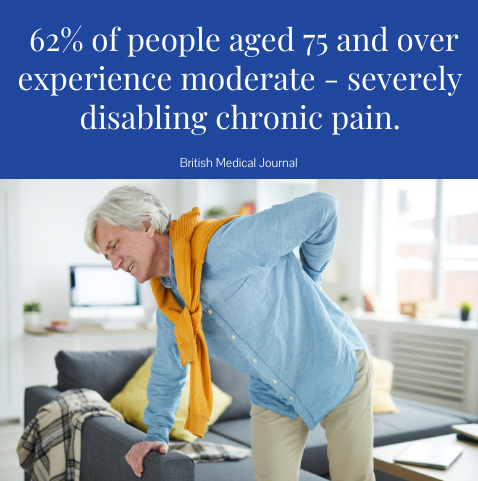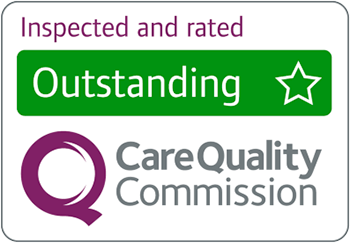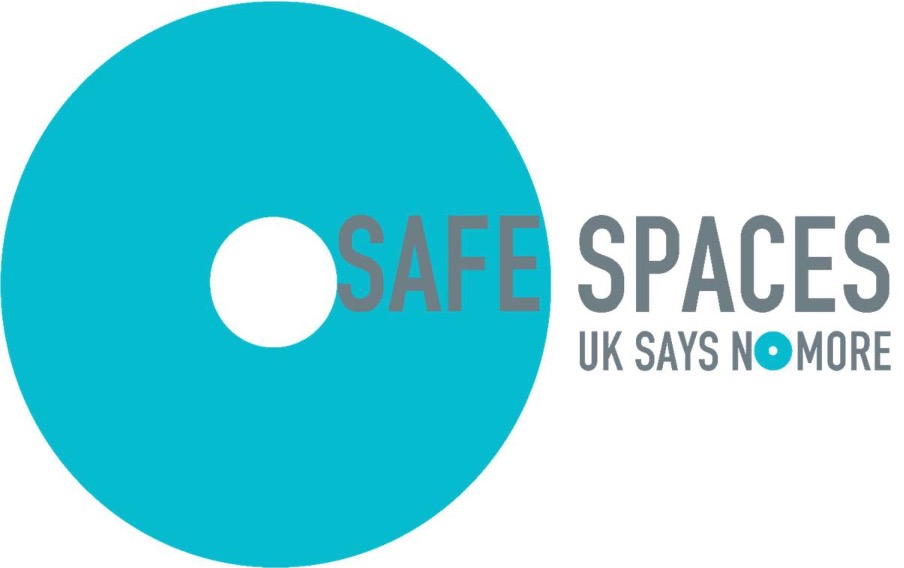Millions of people live with persistent or chronic pain and the effects of this can be all-consuming, having a huge impact on someone’s quality of life.
Pain is a very complex issue and can often be misunderstood by those who experience it as well as those who treat it. Until recently, persistent pain which could not be identified by a physical cause, was often dismissed as being psychological and effectively, imagined. Whatever its cause, as anyone living with persistent or chronic pain knows, the impact on quality of life can be huge.

What is chronic pain?
Chronic pain is pain that lasts longer than 12 weeks, despite medication or treatment following its cause, such as an injury or an operation.
Persistent pain in elderly people is often caused by musculoskeletal disorders which are particularly prevalent in older age, resulting in decreased mobility and an increased risk of functional impairment, falls, depression and sleep disturbances.
In many cases chronic pain is under treated as older adults feel it is just a natural part of ageing but often pain acts as a warning system and is your body’s way of alerting you to a problem so it’s important to speak to your doctor. People will experience pain in different ways so discuss the right pain treatment for you, including understanding the side effects of medication, and how to incorporate coping strategies to alleviate pain and increase quality of life.
Living with pain can have a significant impact on mental health as persistent or chronic discomfort effects how sufferers cope with all aspects of their lives, including at home and at work. Problems with sleep, concentration, anxiety and fear are some of the challenges that people will face but with the right pain rehabilitation programme, it is possible to manage and live well with pain.
Coping strategies for living with pain
How you think and feel about pain will also affect how you experience it. Understanding your pain triggers, challenging yourself to do activities or exercises and practicing these regularly will help you to set goals and strategies for coping better and living well with pain.
The NHS publishes a self-help guide which incorporates CBT (Cognitive Behavioural Therapy) to help people living with chronic pain including tips for:
- managing stress
- preserving energy
- sleeping well
- relaxation exercises
- communicating your thoughts and feelings
- gentle exercise – often staying active can help make you feel better but it’s important to take it slowly.
The NHS self-help guide also advocates pacing activities, which are designed to help create balance in daily life. Many people living with pain suffer good days and bad days. On a good day, they might try to do as much as they can while they can, but this often results in exhaustion and more pain, so it’s likely that a bad day will follow. By choosing the tasks you want or need to do, you can learn how best to pace yourself to create a better balance in how you feel every day.
Setting goals is a very useful way of managing your progress and will help to improve your self-esteem too. My Live Well with pain is an online service that was set up by clinicians, offering a range of resources to help people to live better and self-manage their pain, including a goal-setting leaflet to help you and your loved one set goals and discover new confidence and better quality of life.
Home care services can contribute to living well with pain
Christies Care home care services can improve the lives of those living with chronic pain.
Pain can signal that something is wrong in the body and having a live-in carer or regular visiting carer can help to ensure that these signs are not ignored.

Having one-to-one home care and support means that your needs are the sole focus of your carer so they will be more likely to spot any changes or a deterioration in your health.

Having one-to-one home care and support means that your needs are the sole focus of your carer so they will be more likely to spot any changes or a deterioration in your health.

Having one-to-one home care and support means that your needs are the sole focus of your carer so they will be more likely to spot any changes or a deterioration in your health.

Having one-to-one home care and support means that your needs are the sole focus of your carer so they will be more likely to spot any changes or a deterioration in your health.

Having one-to-one home care and support means that your needs are the sole focus of your carer so they will be more likely to spot any changes or a deterioration in your health.
“The carer was thoroughly professional and familiar with all medication and ensured visits were carried out by the district nurse. She has also prepared and cooked all meals from scratch – all fresh and tasty produce and together with stimulating conversation has increased our friend’s wellbeing and continuing interest in life. Nothing was too much trouble for the carer.” Colin P (Friend of Client) published on 12 October 2021





